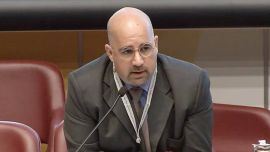National deputy and orthodox liberal economist Ricardo López Murphy traces a future of indispensable and deep reforms for Argentine growth in a context of a changing international context.
A former minister of defence and economy, the 70-year-old has an optimistic outlook as to this country’s possibilities of economic expansion and human capital in a possible new world order.
The big issue today is inflation. When I interviewed President Alberto Fernández last December, I asked him: “Wouldn’t it be more didactic to tell society that, given that we cannot agree on which spending to reduce or which taxes to add with nobody lending to us, we have no other alternative than to print money to finance our deficit?” Is this inflation the consequence of our failure to reach agreement and hence self-inflicted by everybody?
By the government, mainly because when you’re elected, you have the responsibility of fiscal and monetary management. In the long run, in the course of several governments, we’ve now been running almost 80 years of inflation. That’s a problem of fiscal and monetary design. I always remember the convertibility of Carlos Pellegrini in 1890, implemented during the second [1898-1904] presidency of [Julio] Roca, which gave us 55 years of stability. Between 1891 and 1945, Argentina had less inflation than the United States and more growth. If we redesigned our fiscal and monetary regime, we wouldn’t have inflation. Thus Italy and Spain, which had far more inflation than Germany, converged towards German levels of inflation with the euro. The problem is the design of the fiscal and monetary institutions and not just monetary because in the final analysis, as you have aptly pointed out, the taxman running amok ends up disrupting the monetary order.
In 2001, as the economy minister preceding [Domingo] Cavallo, you anticipated the crisis of 2002 with its fourfold devaluation and unemployment reaching 25 percent, finally reduced to eight percent by creating new jobs on the basis of wiping out wages without collective bargaining. Could you say that [caretaker president Eduardo] Duhalde, consciously or unconsciously, halved the wages in efficient companies in order to create jobs for people who during convertibility, with pay high in dollar terms, could not have them? Would removing inflation in today’s Argentina imply more unemployment?
There were problems coming from the regime itself. During those years we had a lot less deficit than previously but not sufficient for such a demanding regime as convertibility – there was a correction but insufficient. In addition – and that was a decisive factor – we had a terrible external shock. When commodity prices plunged, Argentina’s capacity to pay both at home and abroad was diminished, but above all for wage-earners and public spending. When that happened, there came the second shock, which was neighbouring Brazil with the same structure as us. And that was combined with a crisis of financing because, in view of the difficulties, that was withdrawn.
In general, that’s hard to resist. That’s why I always maintained that Argentina needed a staggering amount of discipline. You will recall that I always say that my ministerial idol was Víctor Molina, the [economy] minister of [1922-1928 president Marcelo T.] de Alvear, who reverted to convertibility. That’s sometimes lost, given the distance. But it was very significant that the severest austerity in Argentine history came under Hipólito Yrigoyen. Not because he wanted it that way but because our tax structure depended on customs duties. The [1914-1918] war cut off our exports so spending had to be very drastically reduced. But under the Alvear presidency, Molina succeeded in returning to pre-war convertibility, something which neither Britain nor France could achieve.
Valuing the stability of the currency matters a lot to the culture of a society. During all that time Argentine society paid enormous attention to that while in our culture since Duhalde, card tricks pay off in the sense that they are tolerated. Europe, in situations yet more difficult than ours with the problems of the PIGS [Portugal, Ireland, Greece and Spain] was more severe than we were at the end of convertibility and none of them left the euro, making the corrections to stay inside. I believe that it is not only a question of institutions but also, as you say, of cultural values. It lies within the psychology of the society entering into inflationary crises and sliding out of control, as has happened to Argentine society.
The question is whether a significant part of Argentina does not culturally prefer high inflation to the remedies necessary to prevent it. What would happen to a presidential candidate who honestly said: “If we don’t want inflation – with a régime comparable to convertibility, a common currency with Brazil or any of the alternatives which imply reducing the fiscal deficit without being able to finance it by printing money – social plans, some pensions and subsidies would have to be reduced”? What would happen to the 20-plus percent of Argentines who are not competitive in a market economy?
I wish that were the problem because that problem exists in all societies. Growth in modern societies is unequal, not harmonious. Technological change and modernisation produce a sector which runs ahead and then the rest try to catch up. To the degree that the human capital and the skills are generalised, society becomes more egalitarian, as is happening in East Asian countries and in European countries, especially the Scandinavian. But in general every innovation produces a distribution with a lag for part of society. We know how to correct that.
What is more complex to correct, according to my criteria, is the immense number of privileges and scandals. For example, the vice-president [Cristina Fernández de Kirchner] pocketting 100 times the minimum pension. What is the logic of something so scandalous, so gross, so lacerating for a society in so much pain? It forms part of impunity.
How much do all those privileges contribute to the budget as a percentage of gross domestic product?
A high one because all those privileges are very varied – access to capital controls or the delirious quotas of our corporatist and feudal system. For example, the ROEs [Registros de Operaciones de Exportación] of Cristina’s last presidency exacted US$10 billion from wheat alone, an immense sum. Now everything is in quotas so that anybody who wants to export or receive hard currency or a loan or special tax treatment must have friends.
I proposed a formidable pension reform, which was not my proposal but responded to the idea of that great moderniser [Juan Bautista] Alberdi of equality before the law. My idea was to pension everybody including Ricardo López Murphy via the ANSES social security administration. Argentina has 200 pension regimes for which this reform was proposed. The president and his minions have made a banner out of saying: “We’re not going to reform anything” in a country with 200 regimes which do not respond to any actuarial logic but to privileges towards which common citizens pay much more than they are going to receive.
You’re referring to different privileged groups like the Armed Forces, the Judiciary...
No, for example the Buenos Aires Provincial Bank [BAPRO] pensions or provincial regimes like in Santa Cruz, scandalously financed by federal funding. In the federal revenue-sharing system there are provinces which receive six or seven times more per capita than the City of Buenos Aires. Buenos Aires Province is poor with approximately 80 percent of the country’s average per capita income yet it receives approximately 55 to 60 percent of what it would with equal distribution. In a country like Germany, Canada or Australia it would receive more because it is a poor province. Here it is looted because it is a big province. The poor of Buenos Aires finance the wealthy of our feudal system so you need to start with the system of federal transfers, which is not easy. That is constitutionally mandated.
It has always amazed me, I have so many years of struggle in Argentine public life but I’m still wet behind the ears, every day I discover things. Two of our presidents, one of our vice-presidents and Supreme Court justices have all been Constituent Assembly delegates.
The chief justice of the Supreme Court…
There has been no proposal to reform federal revenue-sharing which, as established by the Constituent Assembly in 1994, was to have been carried out before the end of the year 1996. One of those Constituent Assembly delegates served two terms as president and has said that it is impossible to comply with the constitutional instructions which she herself wrote. After that does it not strike your attention when the person writing our Constitution says that it is impossible to heed?
If taken at face value, it would seem that we Argentines are morons incapable of reaching agreement. No, it’s that we have designed systems of monetary authority, fiscal regime and public life which are absurd.
If you follow my reasoning – since, as you say, we Argentines are not morons – might it not be that the remedies needed to eliminate such high inflation, a symptom of macro-economic disorder, would imply an important percentage of society being losers for a period of time and that would be socially unacceptable? Expressed otherwise, do many Argentines prefer decadence to a couple of years of suffering along with an atavistic scepticism towards promises of future success?
No, we need a leadership aware of the magnitude of the reforms needed, who have the critical mass to push them through and who are up to posing that challenge, of constructing a more equal society in the sense of greater possibilities for everybody. That stems from the distribution of human capital.
[Domingo Faustino] Sarmiento’s programme was very modern and continues to be so today. Where equality happens, it is because human capital has become less heterogeneous. Human capital is four times more important than physical capital. If an important educational programme can be achieved, the possibility of Argentina becoming a society with European indicators should not be far off. Before World War II that bet was on.
Returning to the same point, to make society competitive again, as all successful societies have done in the past, will it be necessary for some of the population to suffer in a big way?
With economic reforms we would have results very fast because this economic regime is very absurd.
How much do you estimate an annual inflation of 50 percent would contribute to government revenues as a percentage of GDP?
Approximately 3.5 to 4 percent of GDP, more or less US$20 billion.
That’s why the International Monetary Fund (IMF) accepts high inflation in its agreement, because that’s one way of balancing the budget, otherwise it wouldn’t happen.
That also emerges from the dialogue with our authorities who try to make them understand that the fiscal and monetary nature of inflation is an extraordinary effort.
That’s the point – reducing the fiscal deficit by an additional four percent of GDP would imply a social and political earthquake.
It would imply, for example, putting an end to many of those crazy privileges, all those privileged mechanisms for feudal courtiers. Argentina needs a very profound reform. The next administration will stake its place in history with a very deep reform.
How do you imagine a Juntos por el Cambio facing up to this cultural change in 2023? If they win by a landslide, would the opposition – who did not deny them support in the first year of the Macri government – back them up even more in 2024?
Many people already understand and will understand the nature of our difficulties.
What would it take to win that landslide? You say that the base of support must be broadened.
The base of support must be as broad as possible and that explains many of my political attitudes. In general I don’t answer insults – I’m always there with my arms wide open. I know that we need to be broader and that’s what I’m going to try to do. And I know that our programme is very important – a programme able to take advantage of the opportunities.
Assuming you have the correct programme, to achieve that political strength, that critical mass, as you called it, in order to be able to implement it with a broader base of support, would you need to add on the libertarians of [Javier] Milei and [José Luis] Espert?
Fragmentation on that side would clearly damage the critical mass and thus be perceived as dysfunctional by Argentine society. If you ignore the ideological baggage and the fireworks and listen to their arguments, there are things to which we can refer. We’d be like Australia, New Zealand or Canada, speaking of ourselves as moving towards advanced societies which do not have the crazy misallocations we have in our country. So the allocation of funds must be improved, restoring the credibility of justice with legal security where there are advances.
You’re very optimistic.
I am, in the sense that it does not seem to me that nothing can be done. And secondly, because the technological changes are enormously favourable for this part of the world. And the crisis too because if we had met a year ago, neither you nor I, who are both sharp observers with exposure to the world and knowledge of global debates, neither of us would have suspected a war of this magnitude in the heart of Europe. We would have said that some deal would be made. The technological changes which have occurred alongside the pandemic are changes which have cut distances. We are at the bottom of the world but transport is cheaper.
You say that technology has conquered distance, thus favouring a distant country like Argentina.
Greatly and favoured by location, foreign relations and the complementation with neighbours. It’s a part of the world without risk of racial, religious or border conflicts where there are immense opportunities because our relative backwardness is something serious.
You thought that about 2002 too when you ran in 2003.
There the opportunity was more formidable because the Kirchners and populism had not had the time to destroy our economic, institutional and ethical organisation to the degree they have now done. We’ve had a terrifying ethical crash.
Compare this situation now with 2002.
In 2002 we were coming out of a capital-intensive decade. Argentina had invested very well with a very efficient economic organisation. There were problems because that organisation probably required international prices and soy had fallen to US$150 [per ton], which was deadly. We had a certain Achilles heel which needed improving but we had a very reasonable economic organisation prior to 2002. The destruction of the educational system was less, the vulnerability to drug-trafficking and organised crime was less. We had many institutional attributes which we’ve been losing.
The poverty was less.
There was an exceptional opportunity in 2003, you don’t know how much I lament having missed out on that opportunity because the country had the chance to conjugate belief in a republican democracy with a market economy, doing what the developed world does with exemplary personal decency. It would have been a spectacular mix.
Are all the conditions inferior to 2002?
Not all of them, the technological change has been very favourable and the global context is more favourable in terms of where the conflicts are. My feeling is that the political leadership today is much more prepared than it was then.
In the comparison between 2002 and 2022 of the advantages and disadvantages for Argentina being able to produce the reform which you mention, could it be that today society has shifted more to the right? Do you perceive that today you have greater visibility and influence than 10 years ago as a symptom of society being more predisposed than it was in 2002 when anti-capitalism was more popular?
Are you saying that I would pick up many more votes now than then?
I would conjecture that the failure of the 1990s made certain, we might say, more traditional ideas in economic terms lose a force which they might be regaining today.
They are regaining force in Argentina and the world. The actions of [Vladimir] Putin have made the world rediscover from the United States through Europe, Australia, New Zealand and Taiwan to Japan the value of a pluralistic and democratic society subject to the separation of powers, an open society. There is an asset which refuses to be hidden because it is there, the colossal failure of Chavismo, the socialism of the 21st century [in Venezuela], the colossal Cuban failure, the colossal failure of North Korea, the colossal failure of [Nicaragua’s Daniel] Ortega. The facts are stubborn.
From those who rebelled under slogans which once thrilled me to thrilling a person aged 70, you have to make an effort. But that slogan of “Patria y vida” [life] against the brutal “Patria o muerte” [death] has fascinated me. Nevertheless, the Cuban leadership has ferociously punished those marching in the streets to ask for liberty in an incredible fashion.
Between the examples you mentioned: North Korea, Cuba, Nicaragua,and Venezuela versus a traditional republican, capitalistic and democratic system, are there variants of capitalism, are there shades of grey?
There is a capitalistic revolution we could make which would have more Scandinavian tones if certain aspects prevail and more competitive tones if other aspects prevail. But we are heading towards a more open, not closed, authoritarian and totalitarian society. The shades of difference within an open and pluralistic society are not the issue. The Scandinavian economies are the most open in the world.
And within that context, how would you imagine Juntos por el Cambio in 2023? Less Scandinavian incorporating the libertarians or more Scandinavian conciliating the Radicals like [Jujuy Province Governor] Gerardo Morales, who has an economic vision, we might say, closer to Peronism?
I share the caucus with many Radical deputies from Mendoza who have a great affinity with me – from Catamarca, from Buenos Aires Province. If you ask them, all would pick the Scandinavians or Germany or Canada while it would not occur to any of them to choose North Korea or [Hugo] Chávez. Things are not on that side, of that I’m sure.
Now if the question is affinity with an orthodox vision like the protocols in medicine, I prefer to follow the protocols. There are some very intelligent people who can work outside the protocols. In general we average people are not so smart as to move outside the protocols. That’s why I go for orthodoxy as the protocol because you have to be very talented to go beyond. I’m not saying it cannot be done but it’s for very talented people. It’s such a complex situation we have, why not bet for once on doing it like the successful countries?
Is it possible to construct within Juntos por el Cambio a narrative and a platform common to the different sectors comprising it, despite the differences.
That’s the real challenge, if it’s done well, the rest is irrelevant.
And don’t you care who the candidate is?
If that is well done and the ground rules fixed, it would be better if it were somebody with their lights switched on. But it seems to me that the most important things are the institutions and understanding the magnitude of the reform, the direction we are taking and the opportunities we have. Because throughout the first part of this interview you were worried by the suffering of a fraction of society. And I cannot sleep at night thinking of the immense opportunities in front of us which we are missing.
The challenge is resolving both problems.
If the programme is appropriate, if the narrative is appropriate and if the ground rules make us cooperate and we can make it happen, I aspire and hope that we can deliver to society a successful reform and that’s what I work towards – a reform which will again place Argentina on a path of progress with a systematic advance, so that we can convert Ezeiza [international airport] into a place of reunion with our children and grandchildren, instead of seeing them off in disappointment, sadness and frustration.





















Comments